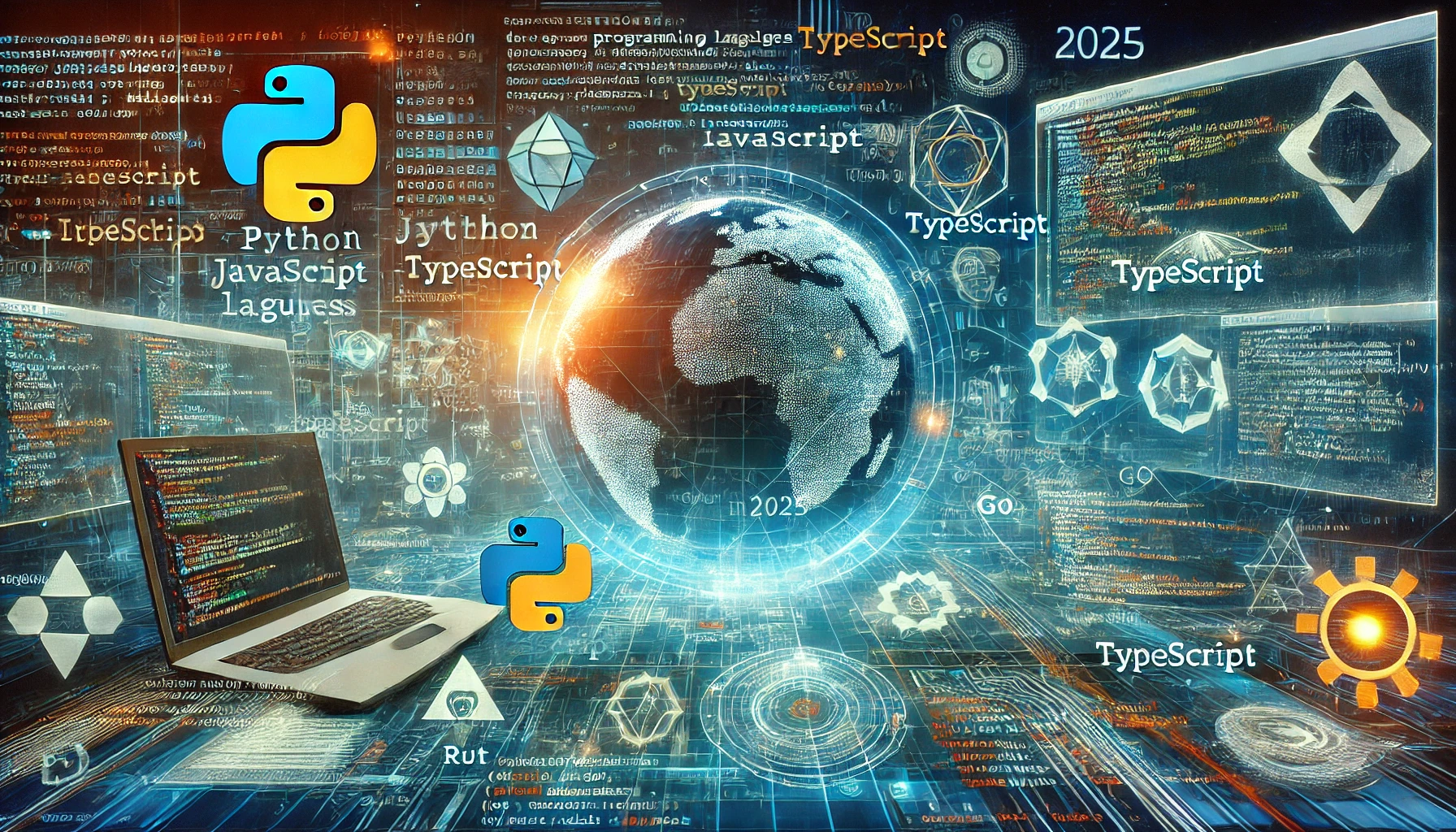With technology advancing at an unprecedented pace, programming skills are more essential than ever for a successful tech career. However, with so many programming languages to choose from, deciding which to focus on can be challenging. Whether you’re a beginner or an experienced developer, here are the top programming languages to learn in 2025 to ensure your skills remain relevant and valuable in the years ahead.
1. Python: The All-Rounder
Python continues to dominate the programming landscape, and for good reason. Known for its simplicity and readability, Python is versatile enough for applications in web development, data science, machine learning, artificial intelligence (AI), automation, and more.
Why Python in 2025?
- AI and Machine Learning: Python’s extensive libraries, like TensorFlow and PyTorch, make it a top choice for machine learning and AI applications.
- Data Science: With libraries like Pandas, NumPy, and Matplotlib, Python is a staple in data science and analytics.
- Web Development: Frameworks like Django and Flask make web development efficient and scalable.
Python’s versatility and massive community support make it one of the best languages for 2025 and beyond, especially for those interested in AI, automation, and data-driven fields.
2. JavaScript: The Language of the Web
JavaScript powers most of the web, and it’s not going anywhere. With frameworks like React, Angular, and Vue.js, JavaScript is the go-to language for frontend development and increasingly popular for backend (Node.js) and mobile development.
Why JavaScript in 2025?
- Web Development: As the primary language of the web, JavaScript remains essential for frontend and increasingly backend development.
- Growing Ecosystem: The rise of frameworks like Next.js and Svelte and backend solutions like Deno and Node.js make JavaScript an all-purpose language.
- The Metaverse and Web3: JavaScript’s role in developing immersive, interactive environments positions it as an important language for future technologies, such as virtual and augmented reality applications and blockchain-based platforms.
If you’re looking to build a career in web or mobile development or to stay at the forefront of interactive tech, JavaScript is a solid choice.
3. Rust: The Performance-Powerhouse
Rust has been making waves due to its memory safety, performance, and growing adoption in systems programming. Rust is ideal for developers who need a combination of speed, safety, and concurrency. Originally popular with systems programming and performance-critical applications, Rust is now gaining traction in web development, networking, and more.
Why Rust in 2025?
- High Performance: Rust’s performance rivals C and C++ while offering greater memory safety, making it perfect for low-level, high-performance applications.
- System-Level Development: Rust’s capabilities make it ideal for operating systems, blockchain, and embedded systems.
- Growing Adoption: With support from tech giants like Microsoft, Amazon, and Mozilla, Rust is becoming a top choice for mission-critical software.
Rust is an excellent language to learn if you’re interested in building high-performance systems or low-level software development.
4. Go: The Cloud Native Language
Go (Golang) has carved out a niche in cloud and server-side development, particularly within companies focusing on distributed systems, microservices, and cloud computing. Developed by Google, Go is favored for its simplicity, speed, and suitability for large-scale, concurrent applications.
Why Go in 2025?
- Cloud Computing and DevOps: Go is popular in cloud computing environments and is the language behind popular tools like Docker and Kubernetes.
- Concurrency: Go’s concurrency support makes it ideal for applications that need to handle multiple tasks simultaneously, such as APIs, web servers, and cloud services.
- Microservices Architecture: As more organizations shift to microservices, Go’s efficiency and scalability make it an excellent choice.
If you’re interested in cloud computing, DevOps, or backend services, Go will be a valuable language in 2025.
5. SQL and NoSQL: The Backbone of Data
While not a programming language in the traditional sense, SQL (Structured Query Language) remains a critical skill in 2025. Alongside SQL, NoSQL languages like MongoDB’s query language are gaining importance due to the rise of unstructured data and flexible data models.
Why SQL and NoSQL in 2025?
- Data Analysis and Business Intelligence: SQL is essential for data analysis, business intelligence, and decision-making in data-driven companies.
- Big Data and Real-Time Analytics: NoSQL databases like MongoDB, Cassandra, and Redis support large volumes of data and high-speed processing, making them crucial for modern applications.
Proficiency in SQL and NoSQL is essential if you’re pursuing a career in data science, data engineering, or any data-intensive role.
6. Kotlin: The Future of Android Development
Kotlin has officially replaced Java as the preferred language for Android development. Its modern syntax, null safety, and seamless compatibility with Java have made it incredibly popular among Android developers.
Why Kotlin in 2025?
- Native Android Support: Google’s official support means that Kotlin will continue to dominate Android app development.
- Cross-Platform Development: Kotlin Multiplatform offers cross-platform development capabilities, allowing developers to write code that can run on iOS, Android, and web applications.
If mobile development is your focus, especially on Android, Kotlin is the language to learn in 2025.
7. TypeScript: The Typed JavaScript
TypeScript, a superset of JavaScript, has become a popular choice for developers who want to write safer and more scalable code. TypeScript’s static typing helps catch errors early in development, making it ideal for large-scale applications.
Why TypeScript in 2025?
- Large-Scale Applications: TypeScript’s strong typing system makes it easier to maintain and scale large codebases.
- Popularity in the Industry: TypeScript’s adoption is growing rapidly, especially within companies like Microsoft, Airbnb, and Slack.
- Enhanced JavaScript Experience: TypeScript integrates seamlessly with JavaScript, allowing developers to gradually adopt it into existing projects.
TypeScript is an excellent choice if you’re working with JavaScript and want to write more reliable, maintainable code.
8. R: The Data Science Specialist
R is a language designed specifically for statistical computing and graphics, making it invaluable for data science, analytics, and visualization. Though Python is more versatile, R remains popular among statisticians and data analysts.
Why R in 2025?
- Specialized Libraries: R has libraries like ggplot2 and dplyr that make data visualization and statistical analysis more efficient and powerful.
- Growing Demand in Data Science: R’s statistical analysis capabilities are unmatched, and many data science and research roles require or prefer R proficiency.
If your career interests lie in statistical analysis, bioinformatics, or data science research, R remains a relevant choice.
9. Swift: The iOS Developer’s Choice
Swift is Apple’s modern programming language for iOS and macOS applications. With its clean syntax and performance optimizations, Swift is gaining traction, especially with the continued growth of the iOS ecosystem.
Why Swift in 2025?
- Native iOS and macOS Development: As Apple continues to dominate the mobile market, Swift’s demand is strong for developing iOS, macOS, watchOS, and tvOS applications.
- Growing Popularity: Swift is relatively easy to learn and offers significant performance improvements over Objective-C.
If you’re aiming for a career in mobile development with a focus on Apple products, Swift is the language to learn.
Final Thoughts
Choosing the right programming language depends largely on your career goals, interests, and the industries you wish to enter. Here’s a quick recap to guide your choice:
- Data Science, AI, and ML: Python, R
- Web Development: JavaScript, TypeScript
- Mobile Development: Kotlin (Android), Swift (iOS)
- Cloud and Systems Programming: Go, Rust
- High-Performance Applications: Rust
- Blockchain and Finance: Solidity, JavaScript
- Data Management: SQL and NoSQL
Learning any of these languages will help you build a strong foundation and stay competitive in the rapidly evolving tech landscape. Whichever you choose, focus on mastering the concepts and building practical experience, as these skills will be the true drivers of your success in 2025 and beyond.


Leave a Reply